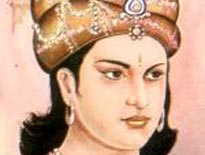 One of the greatest emperors of all times, Emperor Asoka was a Mauryan ruler whose empire spread across the Indian subcontinent, stretching from the present day Pakistan and Afghanistan to Bangladesh and the Indian state of Assam to Kerala and Andhra in south India, thus covering a vast area. He is known as Asoka the Great since he was one of the most able rulers who ruled India. Under his rule, the entire India was united as one single entity with smooth administration. His life is an inspiration to many as he excelled in everything he did. The name Ashoka means "without any sorrow" in Sanskrit. Read on this biography about the life history of famous Buddhist emperor, Ashoka.
One of the greatest emperors of all times, Emperor Asoka was a Mauryan ruler whose empire spread across the Indian subcontinent, stretching from the present day Pakistan and Afghanistan to Bangladesh and the Indian state of Assam to Kerala and Andhra in south India, thus covering a vast area. He is known as Asoka the Great since he was one of the most able rulers who ruled India. Under his rule, the entire India was united as one single entity with smooth administration. His life is an inspiration to many as he excelled in everything he did. The name Ashoka means "without any sorrow" in Sanskrit. Read on this biography about the life history of famous Buddhist emperor, Ashoka.Born in 304 BC, the great king Ashoka was the grandson of the famous ruler Chandragupta Maurya and son of Mauryan emperor Bindusara and his queen, Dharma. As a young lad, Ashoka excelled in whatever he was taught. Be it the art of warfare or reading the Holy Scriptures, Asoka excelled in everything he did. Ashoka had many half brothers and was loved by one and all. Thus, after his father died, his elder brother Suman took over the reign of the kingdom. But most of his father's ministers found Ashoka to be more efficient and helped him attain power. After a three year war, Ashoka was accepted the throne and was crowned as the king of Magadha in 273 BC. After being crowned as the king, he proved himself by smoothly administrating his territory and performing all his duties as an able and courageous king.
After a period of eight years of serving as the king, Ashoka planned to seize the territory of Kalinga, the present day Orissa. He led a huge army and fought a gruesome battle with the army of Kalinga. The battle of Kalinga made him pledge to never wage a war again. The battle took place on the Dhauli hills that are located on the banks of River Daya. Though Ashoka emerged victorious at the end, the sight of the battlefield made his heart break with shame, guilt, and disgust. It is said that the battle was so furious that the waters of River Daya turned red with the blood of the slain soldiers and civilians.
The sight of numerous corpses lying strewn across the battlefield made his heart wrench. He felt sick inside. The battle ground looked like a graveyard with bodies of not just soldiers but men, women, and children also. He saw young children crying over the bodies of their dead parents, women crying over the bodies of their dead husbands, mothers crying over the loss of their kids. This turned him heartbroken and thus, made a pledge to never ever fight a battle again. To seek solace, he converted to Buddhism. He was so inspired by the teachings of the Buddhist monks and Buddhist philosophies that he used his status to impart this knowledge all over the world. He is credited to be the first Emperor to make a serious attempt at developing Buddhist policies.










0 comments:
Post a Comment